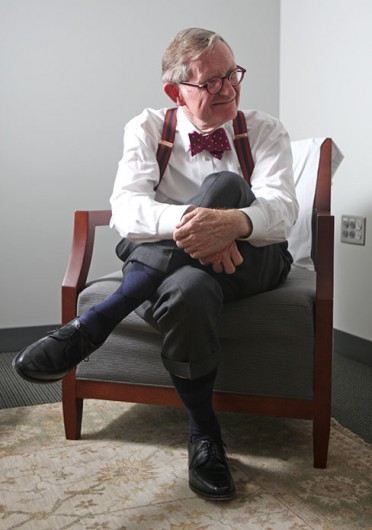
OSU President Emeritus E. Gordon Gee during an interview with The Lantern Oct. 21.
Credit: Shelby Lum / Photo editor
When E. Gordon Gee accepted the West Virginia University presidency, he gave up his rights to an Ohio State office, secretary and $710,000 annually in salary and grant money as his employment with OSU ends July 1. But Gee didn’t give up everything.
Former OSU President Gee will be provided lifetime executive health insurance benefits at OSU’s expense after he is no longer employed anywhere else, will be permitted to receive a payout of “any accrued, but unused vacation leave,” will continue to have a split dollar insurance policy and will retain his president emeritus title, according to a letter senior vice president, senior adviser to the president and general counsel Christopher Culley sent Gee, dated March 26 and obtained by The Lantern Friday.
Gee will also be able to claim the $800,000 OSU added to his retirement continuation plan as part of his post-retirement contract.
Gee’s post-retirement contract with OSU said he was set to remain a tenured member of OSU’s Moritz College of Law faculty and work on researching 21st Century education policy, as well as serve as president emeritus.
That contract promised $5.8 million in its terms, to be paid out over a five-year period and including a base salary of $410,000 and an annual grant of $300,000.
The deal also guaranteed Gee an office and a secretary, which he will no longer have after July 1.
OSU spokesman Gary Lewis noted the savings of the new deal.
“The university (has) estimated that it will save approximately $4 million over the five-year period due to Dr. Gee’s acceptance of the permanent presidency of West Virginia University,” Lewis said in an email Friday.
Lewis referred The Lantern to university policy about employee accrual of vacation.
That policy states unclassified administrative and professional personnel employed as full-time employees for between three and 10 years earn five sick days and five vacation days per year.
Gee is also set to partially continue his work on OSU’s Center for Higher Education Enterprise as a senior fellow, which Culley noted was because of Gee’s own wish to remain affiliated with the center for “scholarly work.”
Culley thanked Gee in the letter for his decision to contribute the rest of his $1 million pledge for scholarships to OSU, though he is not contractually obligated, a portion of which will go to the Center for Higher Education Enterprise at Gee’s request.
Gee did not respond to an email requesting comment Friday afternoon.
Some OSU students said they have mixed feelings about the benefits Gee will still receive.
“I think positively and negatively about that. For one thing, he did a lot for Ohio State so I think that makes sense, but also since he (won’t be) retiring from here, that doesn’t really make sense,” said Erica McCoy, a third-year in biology, about Gee’s guaranteed insurance.
Others, though, said Gee deserves to keep his president emeritus title.
“He served his position and he did it before he retired and came back, so I think he deserves that,” said Isaac Phillips, a third-year in math.
Gee retired from OSU July 1, days after controversial remarks he made at a Dec. 5, 2012, Athletics Council meeting became public. Comments about Notre Dame and the SEC in particular brought national attention.
In December, Gee was appointed president of WVU while it searched for a new permanent leader, but in March, it came out that Gee was a candidate for that position.
He was officially appointed the new president soon after and is set to begin July 1, until which point he will remain on unpaid leave from OSU, but his two-year WVU contract details had not been finalized yet at the time of his acceptance. His salary as interim president at WVU is $450,000.
Gee began his career of leading higher education institutions at WVU in 1981. He was the dean of WVU’s law school prior to his four-year stint as president.
Karly Ratzenberger contributed to this article.


